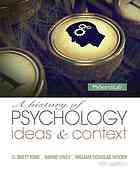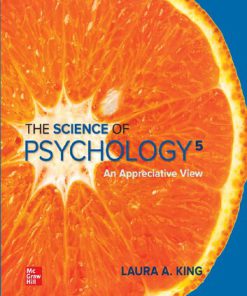A History of Psychology Ideas and Context 5th Edition by King Brett, Woody William Douglas, Viney Wayne 0205963041 9780205963041
$50.00 Original price was: $50.00.$25.00Current price is: $25.00.
A History of Psychology Ideas and Context 5th Edition by King D. Brett, Woody William Douglas, Viney Wayne- Ebook PDF Instant Download/DeliveryISBN: 0205963041, 9780205963041
Full download A History of Psychology Ideas and Context 5th Edition after payment.
Product details:
ISBN-10 : 0205963041
ISBN-13 : 9780205963041
Author: King D. Brett, Woody William Douglas, Viney Wayne
A History of Psychology Ideas and Context 5th Table of contents:
Part 1 Historiographic and Philosophical Issues
Chapter 1 Critical Issues in Historical Studies
Why Study History?
History as a Key to Understanding the Future
History as a Way to Enrich the Present
History as a Contribution to Liberal Education
History Teaches Humility
History Teaches a Healthy Skepticism
History Influences Human Thought Processes
Some Problems in Historiography
The Development of Historical Consciousness
What Is History?
Can History Be Objective?
The Tyranny of the Present
Is There a Pattern or Direction in History?
What Makes History?
The New History or the Old?
What Is the History of Psychology, the History Of?
The History of the History of Psychology
Review Questions
Glossary
Chapter 2 Philosophical Issues
Epistemology
A Priori and A Posteriori Knowledge
Nativism versus Empiricism
Instinct versus Learning
What Are the Criteria by Which We Claim to Know Truth?
The Role of Emotions in Knowledge
Science and Epistemology
Relevance of Epistemology to Psychology
The Problem of Causality
Free Will and Determinism
The Mind–Body Problem
Monism
Dualism
Pluralism
Psychogeny
The Problem of Explanation
Explanation by Analogies and Comparisons
Review Questions
Glossary
Part 2 Early Psychological Thought
Chapter 3 Ancient Psychological Thought
Early Chinese Psychologies
Babylonia
Egypt
Other Ancient Eastern Psychologies
The Hebrews
Persia
Greece
The Cosmologists
Early Greek Concepts of Illness
Relativism
The Golden Age of Greece
Psychological Thought Following Aristotle
Review Questions
Glossary
Chapter 4 The Roman Period and the Middle Ages
Roman Medicine
Galen
Roman Philosophy
Stoicism
Epicureanism
Neo-Platonism
Skepticism
The Fall of Rome
The Early Christian Faith
The Medieval Period
Aurelius Augustine
Boethius
Islam
Judaism in the Middle Ages
The Rise of the European Universities
Conclusion
Review Questions
Glossary
Chapter 5 The Renaissance
The Black Death
A New Worldview: Expanding Geographic Knowledge
Influence of the Greek Classics
Diffusion of Authority
Growth of Empirical Studies
Quantification
Changing Visions of the World
The Heliocentric Theory
Galileo Galilei
The Larger Meaning of the Copernican Revolution
Psychological Thought in the Renaissance
Petrarch
Niccolò Machiavelli
Juan Luis Vives
Leonardo da Vinci
Paracelsus
Michel de Montaigne
Oliva Sabuco
Juan Huarte
Conclusion
Review Questions
Glossary
Part 3 Modern Intellectual Developments That Contributed to the Birth of Psychology
Chapter 6 Empiricism, Associationism, and Utilitarianism
Empiricism
Francis Bacon
John Locke
George Berkeley
David Hume
Empiricism on the Continent
Étienne Bonnot de Condillac
Claude-Adrien Helvétius
Associationism and Utilitarianism
David Hartley
Jeremy Bentham
Mary Wollstonecraft
James Mill
John Stuart Mill
Contributions of Empiricism
Review Questions
Glossary
Chapter 7 Rationalism
Emphasis on a Priori Knowledge
Theory of the Active Mind
Deduction Versus Induction
René Descartes
Descartes’s Method
Baruch Spinoza
Gottfried Wilhelm Leibniz
Monadology
Christian von Wolff
Immanuel Kant
Sense Experience and Reason
Social Psychology
Johann Friedrich Herbart
Thomas Reid and Commonsense Philosophy
Enfranchising Curiosity
Contributions of Rationalism
Review Questions
Glossary
Chapter 8 Mechanization and Quantification
Thomas Hobbes
René Descartes Revisited
Jan Swammerdam
Niels Stensen
Stephen Hales
Robert Whytt
Johann August Unzer
Julien Offray De La Mettrie
Pierre Jean Georges Cabanis
Mapping the Central and Peripheral Nervous Systems
Localization of Function
Extending the Powers of Observation
Speed of a Nervous Impulse
Measuring Behavior
Applications of the New Measurement Techniques
Review Questions
Glossary
Chapter 9 Naturalism and Humanitarian Reform
Evolutionary Theory
Evolution of the Solar System
Geological Evolution
Evolution in Other Arenas of Intellectual Discourse
Organic Evolution
Charles Darwin
Significance of Evolutionary Theory for Psychology
Comparative Psychology
Developmental Psychology
Emphasis on Adaptation
Individual Differences
Herbert Spencer
Naturalistic Approaches to Emotional Disorders
Demonology
The Witches’ Hammer
The Demise of Witchcraft
Humanitarian Reform
Reform in the Treatment of People with Emotional Disorders
Reform in Other Places
Reform Becomes a Social Movement: Dorothea Dix
Reform in the Care and Treatment of People with Cognitive Disabilities
Women’s Reform Movements
Review Questions
Glossary
Part 4 Psychology from the Formal Founding in 1879
Chapter 10 Psychophysics and the Formal Founding of Psychology
Psychophysics
Ernst Heinrich Weber
Weber’s Work on the Sense of Touch
Gustav Theodor Fechner
Rudolph Hermann Lotze
Hermann von Helmholtz
Wilhelm Wundt
General Characteristics of Wundt’s Thought
The Laboratory and the Broader Vision
Some Key Concepts in Wundt’s System
Wundt’s Legacy
The Legacy of Wundt’s Students in Applied Psychology
Review Questions
Glossary
Chapter 11 Developments after the Founding
Systems
Edward Bradford Titchener
Titchener’s Psychology
Margaret Floy Washburn: A Broader Psychology
Franz Brentano and Act Psychology
Brentano’s Psychology
Carl Stumpf
Georg Elias Müller
Oswald Külpe and the Würzburg School
Hermann Ebbinghaus
Wundt’s Contemporaries and Applied Psychology
Review Questions
Glossary
Chapter 12 Functionalism
William James and Harvard University
General Characteristics of James’s Thought
Jamesian Psychology
James’s Legacy
Hugo Münsterberg
Münsterberg’s Psychology
G. Stanley Hall and Clark University
Hall’s Psychology
Functionalism and the University of Chicago
John Dewey
James Rowland Angell
Harvey A. Carr
Psychology at Columbia University
James McKeen Cattell
Robert Sessions Woodworth
Mary Whiton Calkins
The Growth of Applied Psychology
Leta Stetter Hollingworth
Helen Wooley
Binet and Intelligence Testing
Influence of Functionalism: An Evaluation
Review Questions
Glossary
Chapter 13 Behaviorism
Antecedents of Behaviorism
Ivan Mikhailovich Sechenov
Ivan Pavlov
Other Russian Psychologies
Edward Lee Thorndike
Formal Founding of American Behaviorism
John B. Watson
Behaviorism and Applied Psychology
Review Questions
Glossary
Chapter 14 Other Behavioral Psychologies
Importance of Learning
Importance of Precision and Clarity
Importance of Experimentation
Early Behavioristic Psychologies
William McDougall
Edwin Bissell Holt
Walter Samuel Hunter
Karl Spencer Lashley
Neobehaviorism
Clark Leonard Hull
Edwin Ray Guthrie
Edward Chace Tolman
Burrhus Frederic Skinner
Further Contributions to Applied Psychology from Neobehaviorism
Review Questions
Glossary
Chapter 15 Gestalt Psychology
Max Wertheimer
Wolfgang Köhler
Kurt Koffka
Intellectual Background of Gestalt Psychology
Philosophy
Science
Psychology
The Fundamentals of Gestalt Psychology
Principles of Perceptual Organization
Thinking
Learning
Insight: A Further Challenge to the S–R Formula
Developmental Concepts
Gestalt Perspectives on Scientific Method
Mind and Brain: Isomorphism
The Influence of Gestalt Psychology
Kurt Lewin and Field Theory
Lewin’s Field Theory
Tension Systems and Recall
Group Dynamics
The Second Generation of Gestalt Psychologists
Common Misunderstandings of Gestalt Psychology
Gestalt Psychology and Gestalt Therapy
Gestalt Psychology and Scientific Analysis
Gestalt Psychology and Nativism
The Role of Past Experience
Gestalt Psychology and Applied Psychology
The Continuing Relevance of Gestalt Psychology
Review Questions
Glossary
Chapter 16 Psychoanalysis
Sigmund Freud
General Characteristics of Freud’s Thought
Freud’s System of Psychology
Life’s Major Goal and Its Inevitable Frustration
The Structure of Personality
Motivation and Unconscious Processes
Anxiety
Defense Mechanisms of the Ego
Stages of Psychosexual Development
Psychoanalysis as a Therapeutic Technique
Freud’s Social Psychology
Appreciative Overview
Critical Overview
Future Perspectives
Neoanalytic Psychologies
Alfred Adler
Adler’s System of Psychology
Carl Gustav Jung
Jung’s System of Thought
Evaluation
Karen Danielsen Horney
Horney’s System of Thought
Other Developments
Review Questions
Glossary
Chapter 17 Humanistic Psychologies
Intellectual Traditions
William James
Existentialism
Phenomenology
The Formal Emergence of Humanistic Psychologies
Abraham Maslow
Gordon Allport
Carl R. Rogers
Viktor Frankl
Joseph F. Rychlak
Overview of Third-Force Psychologies: Major Positions and Criticisms
Review Questions
Glossary
Chapter 18 The Rise of Contemporary Psychology
The Systems of Psychology in Retrospect
Psychoanalysis
Humanistic Psychology
Neobehaviorism and the Psychology of Learning
Cognitive Psychology
Intellectual Traditions
Themes and Content Areas of Cognitive Psychology
Critical Appraisal of Cognitive Psychology
Clinical Psychology
Intellectual Traditions
Critical Developments
Future Developments
Biopsychology
Intellectual Traditions and Critical Researchers
Technological Advances in Neuroscience
Psychopharmacology
Behavioral Genetics
Psychoneuroimmunology
Social Psychology
Intellectual Traditions
Current Developments
Industrial-Organizational Psychology
Intellectual Traditions
Walter Dill Scott
Lillian Gilbreth
Current Developments
Psychology and Law
Intellectual Traditions
Hugo Münsterberg
Elizabeth F. Loftus
Current Developments
Diversity and Pluralism in Modern Psychology
Review Questions
Glossary
References
Photo Credits
Name Index
People also search for A History of Psychology Ideas and Context 5th :
a history of psychology ideas and context pdf
what is the history of psychology
a history of modern psychology in context
a history of psychology in autobiography
a history of psychology original sources and contemporary research
Tags: A History, Psychology Ideas, Context, King Brett, Woody William Douglas, Viney Wayne
You may also like…
History & Research
Psychology
History & Research
Relationships & Lifestyle - Psychological Self-Help
Psychology and Culture Thinking Feeling and Behaving in a Global Context 2nd Edition Lisa Vaughn
Relationships & Lifestyle - Psychological Self-Help
The Science of Psychology: An Appreciative View 4th Edition Laura A. King Professor
Engineering - Mechanical Engineering & Dynamics
Thermal power plant cooling context and engineering 1st Edition Carey Wayne King
History & Research
The Science of Psychology: An Appreciative View 5th Edition Laura A. King
Politics & Philosophy - Anthropology













